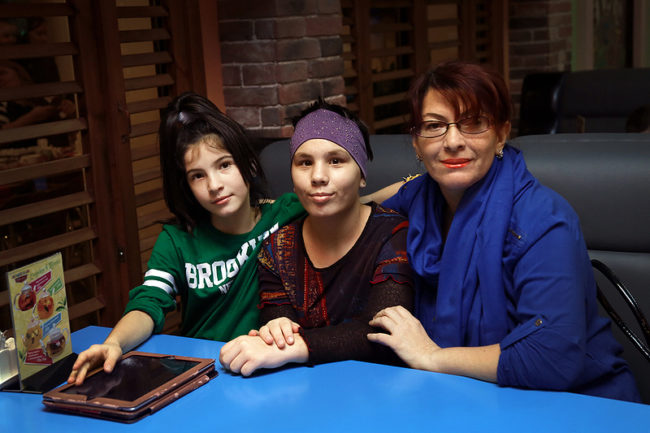
Daghestani security forces classify May police attack as a terrorist act
According to investigators, the assailants had been preparing the attack for six months.


 There are 56,000 children in Russia’s federal database of orphans. This large number is a drop on previous years, with the number of orphans in the whole country declining. In Daghestan, orphans are increasingly being taken in by new families.
There are 56,000 children in Russia’s federal database of orphans. This large number is a drop on previous years, with the number of orphans in the whole country declining. In Daghestan, orphans are increasingly being taken in by new families.
Leyla Gamzatova is a foster mother. She took in Marina, who was 12 at the time, from an orphanage in 2015. Marina was born with disabilities, but Leyla was not afraid to taker her in, as her desire to help the girl was stronger than any fear of difficulties she might face.
‘I always wanted to adopt a child from an orphanage. The doctors recommended that I did not have a child of my own, but I miraculously gave birth to Shakhri. When she turned three, she began to understand that she was alone’, Leyla Remembers.
‘She saw that the other children had brothers and sisters and she cried. Then we started to think of adding a new child to our family.’
Marina was orphaned twice. After giving birth in Budyonnovsk, her mother refused to take care of her. A foster family then took her in, bringing her to the Daghestani town of Izberbash. However, after Marina started school it emerged that she had developmental problems.
Her foster parents gave her up to an orphanage for children with special needs. Three years later Leyla and Shahri took her in.
After some time, problems began to surface with Marina’s behaviour. Leyla says that when she realised that they were not planning to give her back to the orphanage, her behaviour changed, and her communication with the family and neighbours became complicated.
Leyla consulted with psychologists in Moscow, participated in discussions on internet forums, and read lots of books, coming to the conclusion that such behaviour from adopted children was completely normal.
Since 1 September 2012, anyone wishing to foster a child in Russia is required to undergo training at a school for foster parents. A school was launched in Daghestan in October 2016, and since then has certified around 150 prospective parents.
According to the school’s head, Arslana Ramazanova, the age of potential foster parents varies widely, and everyone has their own reasons for wanting to foster a child.
‘These are people from 30 years old. The oldest in my group is now 70 years old. There are childless couples; there are mothers who have lost a child and cannot give birth any more.’
Full-time education in the school lasts two and a half months. The lessons are conducted by social workers, lawyers, psychologists and current foster parents. During workshops they discuss possible difficulties. Sometimes teachers intentionally complicate things in order for prospective parents to understand what they may have to deal with.
Ramazanova says that since the school opened she hasn’t heard of a single case of parents returning a child to an orphanage. She knows of eleven cases where parents have taken in children with disabilities from orphanages. She says, however, that potential parents do not adopt children with more serious medical conditions.
Several months ago, Gazmatova launched a group on Facebook — ‘All children are ours! Community of foster families of Daghestan and the North Caucasus’. They publish photos and information about children, who are looking for foster parents, as well as news and practical advice for those who have decided to take this step.
Members of the group hope to help children find families and thus reduce the number of orphans in the republic and in the country.
Gazmatova recently travelled 1,200 km north of Makhachkala to Samara, where she signed an agreement to foster four girls — aged 15, 10, 8, and 4. The girls are sisters, and according to the Russian law it is prohibited to separate siblings.
Specialists say that the number of the orphans in the country is on the decline, however activists have not become complacent to the problem of orphanhood and foster care, and say that the numbers are still shockingly high.
‘When a child comes to an orphanage they are registered in the regional database. Parents are given a certain time [to change their mind]. Not all the children make it from regional databases to the federal one; only maybe 20–30 from 100. Two years ago there were 180,000 people in the federal database. Of course, compared to this number, the situation today is better, but again it is very large number’, Gamzatova says.
According to Zarema Mursanova, who is head of the Guardianship and Trusteeship Department in Makhachkal’s Sovetskiy District, the number of Daghestanis wishing to foster children has grown over the last few years.
‘People, who want to become foster parents register with us. Among them there can be those who take custody of their underage relatives who for some reason were left without parents’, Mursanova tells us.
‘However in recent years we have got more appeals from those who want to foster someone else’s child. About 4–5 years ago there was only one family waiting for registration. Now in our Sovetsky District alone there are more than 40 families’.
Arslana Ramazanova, who is also director of the social and legal centre Assistance, tells OC Media that the number of orphanages has gone down in Daghestan. She remarks that it could be related to changes in Russian legislation concerning foster care.